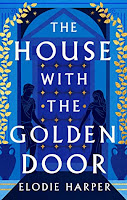Book Review: The House With The Golden Door by Elodie Harper ( The Wolf Den Trilogy #2)
 |
“Gaia Plinia Amara, Liberta”
In AD 75, Amara from The Wolf Den is now a freedwoman, no longer owned by Felix and forced to work in his brothel. She now lives in 'The House with the Golden Door' as a concubine to Rufus to whom Pliny has signed over his rights to her. But is she truly free of her past and all she has had to bear to get to this point? As she navigates her way through her new life she is haunted by the brutality, pain, loss and tragedy in her past.
“Her past is the whirlpool Charybdis, pulling her down under the waves where she cannot breathe.”
While she adjusts to her new life, Amara acknowledges that her well-being is contingent upon how happy she can keep her Patron, Rufus, who though not quite as true as Felix, is jealous and possessive and does not hesitate to hurt her when displeased. Amara is strong and pragmatic enough to acknowledge that her arrangement with Rufus is not permanent and a time will come when she would have to fend for herself.
“The things people do when they know you don’t matter. When they know you are nothing.”
As the story progresses, we see how she learns to harden her heart and use her intelligence and understanding of the people around her to further her interests and those she cares about. She uses her knack for business and numbers to continue her own money lending operations and creates a network of trusted friends and allies – courtesans, business owners and former clients. She misses her sisters from the brothel and is concerned with their fate in the hands of the cruel Felix. Her relationship with Felix remains complicated and she is also not quite free of Felix’s hold on her as her intentions to help her sisters who remain in the brothel results in her in debt to him and having to deal with him and his devious intentions, all the while keeping this a secret from Rufus.
“I am like you Felix, but not you. If you could have brought yourself to acknowledge me, instead of humiliating me, nobody would have been more loyal.”
The House with the Golden Door by Elodie Harper is a captivating story. I enjoyed the setting of the ancient city of Pompeii, the descriptions of the festivities and the ceremonies as well as the references to Greek and Roman Mythology. Elodie Harper shines in her characterizations. I enjoyed Amara’s character development- we see her strength and also her vulnerability and her desire for respect, true love and friendship as is evident in her relationship with Philos. Though her position has been elevated by her 'freedom', her status is not a secure one. It is often difficult to justify the risks she takes and the decisions she makes, but the author does a magnificent job of depicting the complexities in Amara’s character. I also loved how Britannica’s character was developed in this story. Even the characters of Rufus and Felix, though immensely unlikable, are well fleshed out.
Amara’s story and the stories of those around her present a heartbreaking picture of the degradation and abuse endured by slaves and their offspring in that era. The descriptions of the slave market and treatment of slaves – those born into slavery and those turned into slaves from captivity are hard to read. Freedom came with a price with terms solely dependent upon the owner’s discretion and came with no guarantee that freedom could prevent you from being separated from your family. As with the previous book, each chapter begins with a quote from either graffiti on the walls of the ruins of the ancient city of Pompeii or from the writings of ancient Roman speakers. In the author’s note at the end of the book , she discusses the importance of these quotes.
“It is easy to minimize the difficult experiences of Roman women and enslaved people after the passage of so many centuries. They did not have access to belief systems- such as Feminism or the emancipation movement- which would have allowed them to challenge their treatment in a systematic way. But we do have evidence that the Romans fully understood the horror of having your agency denied.”
The author also shares a line from Pompeiian graffiti that “boasts about the endemic abuse enslaved women endured” that reads “Grab your slave girl whenever you want; it’s your right to use her”. The author also mentions that most of the accounts of slavery from that era were written by slave owners and that one could try to comprend the slaves' perspectives in their own voices only from their epitaphs. In The Wolf Den Trilogy, Elodie Harper attempts to reimagine the lives of the enslaved women of that era and gives them a voice. Throughout the narrative , as we follow Amara in her new life, it is difficult to not question the meaning of "freedom" in the context of Amara's life and whether Amara is truly "free". Is she truly more in control of her life now ? To what extent is her life and her fate influenced by those more powerful than her?
Having loved The Wolf Den by Elodie Harper, I was eager to read the second book in the trilogy and I was not disappointed. A lot is going on in this novel but the author manages to tell the story without it becoming too heavy or tedious. While I will admit that this might not have been as compelling as The Wolf Den , The House with the Golden Door is a beautifully-written novel and a magnificent continuation of Amara’s story. I cannot wait for the final installment of the trilogy!
Comments
Post a Comment